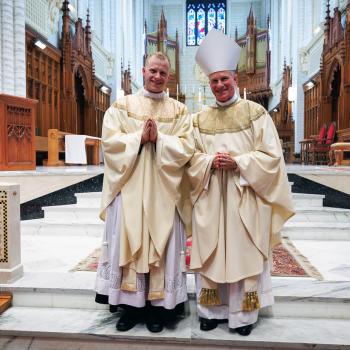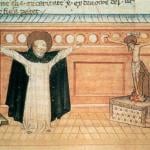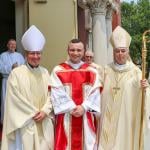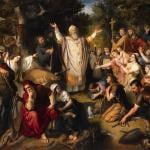A few days back I wrote in praise of muscular church music. And now, the UK’s Damien Thompson is striking a similar chord:
I can’t speak for other denominations, but I’m convinced that the distinctive awfulness of the music in many Catholic parishes helps explain why Mass attendance has fallen off a cliff since the 1970s.
I’m lucky. I live in a London parish where the priest can tell the difference between a good hymn and a bad one. The tragedy is that so many priests either can’t or, more likely, don’t want to upset the choir by banning the dispiriting rubbish written “in the spirit of Vatican II”.
The choice of music at Mass matters as much as the quality of the sermon. That’s always been my opinion, anyway, and recent experiences have only served to confirm it.
At the 9.30 Sunday Mass a few weeks ago we sang “Glorious Things of Thee are Spoken”. The tune is by Joseph Haydn. He wrote it as an unofficial Austrian national anthem and was so proud of it that he used it as the basis for the slow movement of his “Emperor” String Quartet. It was the last music he played, falteringly on the piano, before he died. Later the Germans stole it and sang it to the words “Deutschland, Deutschland über alles”. It’s still their national anthem, though funnily enough that particular verse has been dropped.
But I digress. The organist at this Mass was a professional musician who revealed the lovely proportions of this apparently simple hymn, on which Haydn worked extremely hard.
And people sang – not lustily, exactly, but loud enough to be heard. It’s a congregation of many nationalities; I doubt they knew the words (I certainly didn’t); but they recognised the tune and liked it. Hearing it made my day.
Then, a week later, I went to the Saturday evening Mass for the first time. The organ started up, but within seconds it was clear that the performer would be lucky to scrape through his Grade 1 piano exam. If you listened carefully you could hear the feeble strum of guitar chords.
The hymn, if you can call it that, was one of those numbers that puts the congregation in persona Christi by asking them to pretend that they’re Jesus – “I am the bread of life”, “Come follow me”, “I am the way”. I don’t think the parish priest enjoys this sort of thing and, judging by the squirming in the pews, neither did anyone else. Presumably it’s a legacy from a previous era – when I visited the parish back in the Nineties that was the only style of music on offer.
He has much more to say. Read on.
















